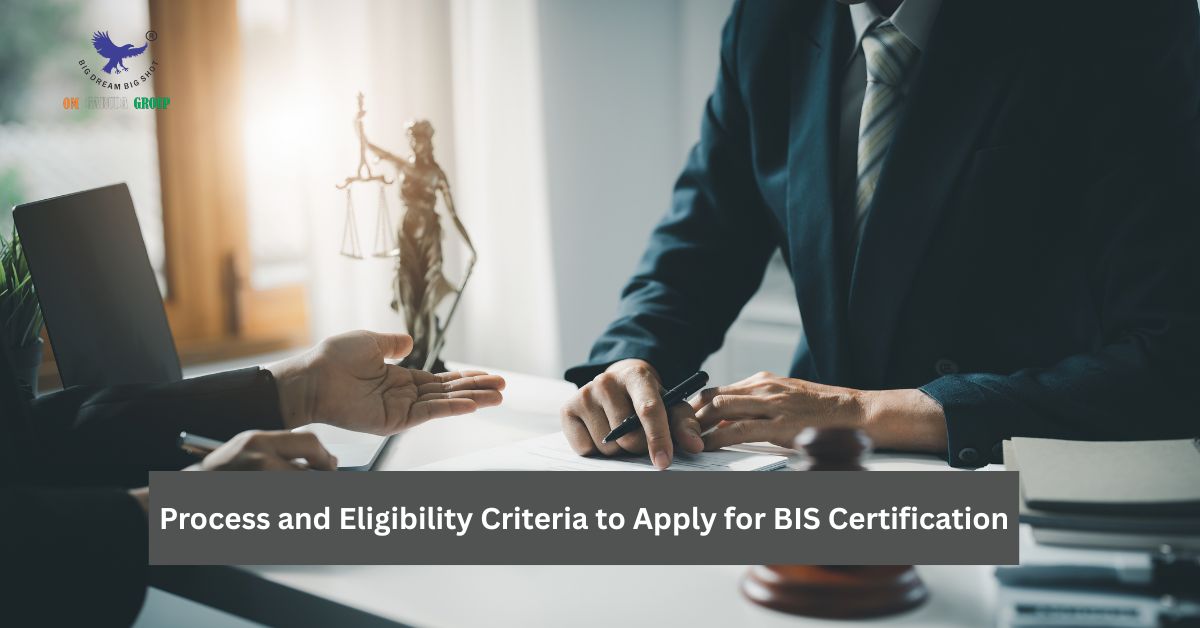
Process and Eligibility Criteria to Apply for BIS Certification
Maintaining quality and safety standards in a competitive market is a basic necessity. BIS Certification is recognized by the Government of India to protect the quality standard in India. BIS (Bureau of Indian Standards) is responsible for ensuring the quality, safety and reliability of products in the market. Understanding the BIS registration process and eligibility criteria to apply for BIS Certification is important if you are looking to sell products in India, whether you are a manufacturer, importer or business owner.
Types of BIS Certification
Everyone knows what is BIS Certification. Now there are three types of BIS Certification in India
- ISI Mark Scheme – For domestic manufacturers.
- Foreign Manufacturers Certification Scheme (FMCS) – For foreign manufacturers.
- Compulsory Registration Scheme (CRS) – For electronics and IT goods.
Eligibility Criteria for BIS Certification
It is of utmost importance to check whether the product which you are going to sell in the Indian market is eligible or not for obtaining the BIS Certification. Let's discuss who is mandated to get BIS Certificate in India:
- Manufacturers: Only the actual manufacturers can apply for BIS registration, no traders, distributors or importers.
- Manufacturing Unit: The manufacturing facility should be located either in India for ISI Mark or abroad for FMCS or CRS.
- Product Standard Compliance: The product must conform to a relevant Indian Standard specified by BIS.
- In-House or Third-Party Testing: Products must pass quality checks through in-house testing or BIS-recognized labs.
Application of BIS Certification
First Step – Identification of Applicable Indian Standard
Each product should have a specific Indian Standard Code. One must identify the correct IS Code applicable to the product.
Second Step – Choosing of appropriate Certification Scheme
Look which of your products falls under which scheme – ISI, FMCS, CRS.
- ISI Scheme – For domestic manufacturers
- FMCS – For foreign manufacturers
- CRS – For electronic and IT products
Third Step – Required Documents
For a smooth BIS registration process, prepare these documents in advance
- Business registration certificate
- Product details and technical specs
- Test reports from BIS-recognized labs
- Factory layout and production process flow
- Quality control system in place
- Trademark registration
Fourth Step – Online application through the BIS Portal
Depending on the type of BIS certification, submit your application through the official BIS portal:
- For ISI Mark – online portal
- For CRS – CRS portal
- Application fee based on the product and scheme
Fifth Step – Testing of the Product
A sample of the product should be tested in a BIS-approved laboratory. BIS can also inspect the manufacturing facility and collect samples directly for ISI and FMCS schemes.
Sixth Step – Factory Audit
BIS officers will inspect your factory to ensure the infrastructure, production capacity, quality control, and test facilities meet the required standards in case of ISI and FMCS certification. For CRS, no audit is required. One needs to upload the test report from a BIS-approved lab.
Seventh Step – License
If your product meets all the requirements and the test results comply with the applicable standard, then BIS registration will be provided. One can use ISI or CRS marks on the product and packaging. BIS certification is valid for usually 1 to 2 years and must be renewed upon expiry.
What are the benefits of BIS Certification?
Let’s understand the advantages of getting the BIS registration or why every manufacturer needs to obtain a BIS Certificate in India:
- Legal compliance with Indian Regulations
- Increase in consumer Trust and Brand Image
- Product acceptance in the market
- Decrease in product recalls and liabilities
- Competitive edge over uncertified products
Documents Required for BIS Certification
Legal & Registration Documents:
- Business License or certification of incorporation
- Trademark License, if applicable
- Proof of office and factory address
- GST Registration
- MSME certificate, if applicable
- Valid proof of ownership or lease of the premises
Manufacturing & Production Details:
- Manufacturing process flowchart
- List of manufacturing machinery
- Details of any outsourcing of manufacturing
Product Testing & Compliance
- Test report from a BIS-recognized laboratory
- List of testing equipment and machinery
- Copies of valid calibration certificates of testing equipment
Other documents required
- Authorization Letter
- Nomination Letter of AIR if a foreign manufacturer
- Product manual or technical specification sheet
- Any additional documents requested by BIS
Challenges which one can face in getting the BIS Certification
The process looks very straightforward but some of the challenges which can come the way are
- Incorrect Indian Bureau Code Selection
- Incomplete Documentation
- Test Failure in Bureau of Indian Standards Labs
- Lack of knowledge of BIS compliance standards
- Hire a BIS consultant or certification expert for the best results
Conclusion
To enter the Indian market, BIS Certification is very important as it marks the quality of any manufacturer or importer. It builds consumer trust with regulatory compliance. With proper planning and advance preparation, documentation, product testing, and factory audits everything is possible. Understanding the process and eligibility criteria to apply for BIS Certification is the step to ensure that the products are accepted and respected in India.
Om Garura Group provides you with end-to-end seamless BIS registration assistance. We assist in step-by-step BIS registration service, documentation, quality checks, legal compliance to consultation. If you are planning to start your business then it’s mandatory to obtain BIS Certification. Contact Om Garura to obtain BIS with complete consulting support.
Frequently Asked Questions
Q1: Who is required to get BIS Certification in India?
A: BIS Certification is required for all manufacturers who want to sell products in the Indian market. This includes Indian manufacturers under the ISI scheme, foreign manufacturers under FMCS, and companies dealing in electronic or IT goods under CRS. Only the actual manufacturer can apply, not traders or importers.
Q2: What documents are needed to apply for BIS Certification?
You need documents such as a business registration certificate, product technical details, lab test reports from a BIS-approved lab, factory layout, trademark certificate, and a quality control process chart. Additional documents might be needed depending on your product and the certification scheme.
Q3: What steps are involved in the BIS Certification process?
The process includes identifying the correct Indian Standard, choosing the suitable certification scheme, gathering all required documents, applying online through the BIS portal, testing the product, factory inspection (if applicable), and finally receiving the BIS license if everything is in order.
Q4: What are the common challenges in getting BIS Certification?
Some common challenges include choosing the wrong Indian Standard Code, incomplete documentation, product test failures, and lack of knowledge about BIS rules. Many businesses hire BIS consultants to avoid delays and ensure the process goes smoothly.
